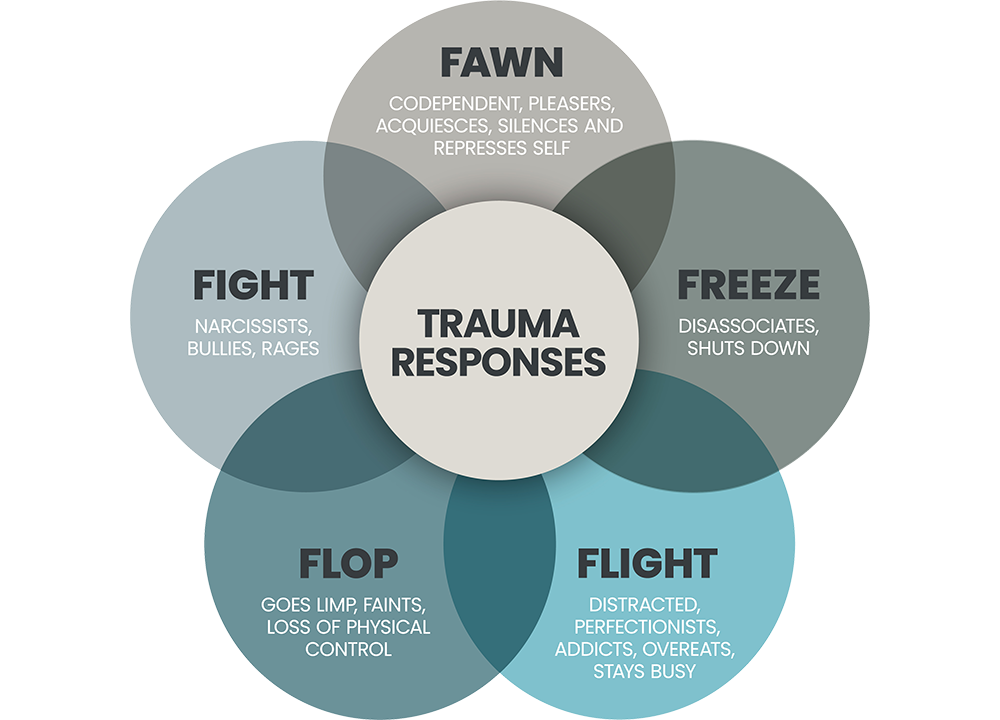“In general, the ability to make sense of tragedy and then find benefit in it is the key that unlocks post traumatic growth.” —Jonathan Haidt
Trauma Counseling in Birmingham, Alabama
Do I have PTSD from trauma?
You could have PTSD from trauma if you have ever experienced or witnessed a life-threatening event which includes perceived-to-be life-threatening events – physical assault, unwanted sexual experience or assault, accident, unexpected loss of a loved one, life-threatening medical illness, the aftermath of life-threatening event or death, etc.
Little “t” Trauma
Or you could also experience PTSD from non-life threatening trauma or little “t” traumas.

Little “t” traumas are highly distressing events that affect individuals personally but don’t fall into the same category as big “T” traumas. Examples of little “t” traumas include Non-life-threatening injuries, emotional abuse or neglect, death of a pet, bullying or harassment, and loss of significant relationships.
PTSD is a response to a traumatic event. Symptoms from PTSD can show up in various ways. Let’s discuss some signs and symptoms of PTSD.

What PTSD Looks Like
- Disturbed sleep or a lack of sleep
- Nightmares or flashbacks of the event (feeling like the trauma is happening in those moments)
- Withdrawal from activities
- Avoiding places or people that remind you of your trauma
- Constantly on edge or anxious
- Easily upset, angry, or agitated
- Being jumpy or easily startled
- Engaging in risky behaviors- substance abuse, driving too fast, gambling
- Finding it difficult to concentrate – including on simple or everyday tasks
- Irritability or aggressive behavior

What PTSD Feels Like
- Feeling like you are in a life-threating situation again
- Intense distress at real or symbolic reminders of the trauma
- Extreme alertness, also called ‘hypervigilance’
- Physical sensations such as pain, sweating, nausea or trembling
- Panicking when reminded of the trauma
- Being jumpy or easily startled
- Feeling depressed and alone
- Heart racing
- Afraid of going to sleep
- Feeling like you can’t trust anyone
- You feel like nowhere is safe
- Feeling like nobody understands
- Blaming yourself for what happened
- Overwhelming feelings of anger, sadness, guilt or shame


Physiological symptoms of PTSD: Why do I feel this way?
When you feel stressed emotionally, your body releases hormones called cortisol and adrenaline. This is the body’s automatic way of preparing you to be able to respond to a threat, also called the ‘fight, flight or freeze response.

Studies show that individuals suffering from PTSD will continue producing these hormones when no longer in danger, which is thought to explain some symptoms such as extreme alertness and being easily startled.
You might also experience physical symptoms similar to symptoms of anxiety, such as headaches, dizziness, chest pains and stomach aches.
Empower Counseling understands how strong these symptoms can be and just how much they affect your daily life.
Flashbacks
PTSD may cause you to experience flashbacks.
A flashback is a vivid experience in which you relive some aspects of a traumatic event or feel as if it is happening to you right now. This might look like you are seeing a video of what happened, but flashbacks do not always involve seeing images, or reliving events from start to finish. You might experience any of the following:
- Seeing full or partial images of what happened to you
- Noticing sounds, tastes, or smells connected to the trauma
- Feeling physical sensations, such as pressure or pain
- Having the same emotions that you felt during the trauma

Common Triggers
Going to particular places, or seeing particular people or being in certain situations can trigger a flashback for you, which could be due to them reminding you of the trauma in some way. Or these flashbacks might seem to happen randomly. Such flashbacks can last for just a few seconds, hours or even days.

Other Difficulties Caused by PTSD
If you are experiencing symptoms of PTSD, you might also find that you have difficulty with some everyday aspects of your life, such as:
- Taking care of your own needs
- Maintaining friendships or relationships
- Keeping a job
- Making decisions and remembering things
- Having a sex drive
- Dealing with change
- Enjoying your leisure time or relaxing

Other mental health issues that can come along with PTSD
When you are suffering from PTSD it is common to experience other mental health problems such as:
- Anxiety disorders
- Depression
- Dissociative disorders
- Self-harm
- Suicidal ideations
What is ACT for PTSD?
The overall goal of ACT for trauma and PTSD is to help you be open and willing to experience your emotions and physiological sensations rather than avoiding them because they are impossible to avoid. Instead, we guide clients toward curating and living the meaningful, fulfilling life they want to live.
Avoidance Does Not Work
As you read this, chances are you have suffered trauma or are helping a loved one who has suffered trauma. If you have experienced trauma, you have most likely tried to avoid the emotions and physical sensations that the trauma has caused you to experience. This experiential avoidance is a completely normal human reaction. But if you have tried to avoid these emotions, feelings, and sensations, you know that avoidance does not work for several reasons.

Unwanted Thoughts and Emotions Will Find You
Avoidance does not make the thoughts, emotions, and unwanted sensations go away. They chase you and find you.
The amount of energy you spend avoiding pain is energy that could be spent toward something positive in your life. It could be spent moving toward what you want in your life, rather than what you do not want.
Attempting and failing to avoid this pain can leave you feeling broken, and like a failure. Then it is easy to become sidetracked by self-criticism, which creates further unwanted issues like anxiety, and depression.
So put simply-AVOIDANCE will not improve your life. Avoidance comes at a high cost. The cost is your ability to engage in a life that is MEANINGFUL to you.

ACT Offers a Different, More Effective Approach
The goal of Acceptance Commitment Therapy for trauma and ACT for PTSD is not to run from the pain but to make room for it. That may sound crazy or impossible when you first read it. I know. It seems counterintuitive. But it only seems that way because your brain has been telling you the way out of your problems is avoidance-and how has that been working so far? Exactly. When you drop the struggle with pain and stop avoiding it, it loses its power over you.
By dropping the struggle, you have the space and the energy to insert what you value so that you can pursue a meaningful and fulfilling life.

Acceptance Commitment Therapy is a multifaceted therapy for trauma and PTSD. Through ACT, the knowledgeable counselors at Empower Counseling in Birmingham, Alabama, use:
Mindfulness & Defusion
You will learn mindfulness techniques to reconnect with the present moment. Through mindfulness, you can defuse or recognize and separate from the unhelpful thoughts that stand between you and the life you want. Defusion will help you detach from these thoughts, leaving space for thoughts about what you value. Focusing on thoughts about what is important to you, helps you take action toward what you want, rather than needing to avoid what you do not want.
Connection to Your Values
Avoidance causes you to lose touch with personal values-what are truly important to you in life. Reconnecting with your values makes it easier to move away from avoidance and toward constructing the life you want to be built around what is most important to you…your “WHY”.

Committed Action
ACT does not just address your thoughts and emotions triggered and driven by your trauma and PTSD. With ACT, it has a strong behavioral component as well. It is not enough to stop avoiding and simply getting in touch with what you value. For real and significant change for the better, our counselors at Empower Counseling help you set goals that align with your values and you begin moving toward them with action.
ACT for trauma and ACT for PTSD will help you move toward psychological flexibility by:
- Staying in contact with your inner experiences
- Allowing them to be there when useful
- Seeing your thoughts as just thoughts.

Why is it important to be psychologically flexible?
Psychological flexibility is the path to resilience. When you are resilient, you are able to bend when life throws you a curveball, rather than break. It allows you to decide what to respond to in life, rather than automatically reacting to everything. Psychological flexibility is a place of focusing and taking action toward what you have control over in life and disregarding what you do not have control over. Overall psychological flexibility is comfortable.

Is ACT evidence based for PTSD?
The short answer is YES! Studies show that Acceptance Commitment Therapy is effective for trauma and posttraumatic problems such as PTSD and substance abuse.
Why Acceptance Commitment Therapy for Trauma and PTSD?
According to a 2021 study published in the National Library of Medicine, “Globally, ACT has been showing a crescent role in the treatment of individuals with trauma histories by enhancing positive outcomes and by being associated with greater psychological flexibility. It is increasingly considered to be well-suited to the treatment of trauma by targeting avoidance, coping strategies with emotional disengagement and persistent dissociation, aspects associated with greater PTSD symptom severity and related psychopathology.”

Research Supports the Use of ACT
Research has also shown that ACT-based treatments are helpful in promoting emotional, behavioral, and neural changes in psychological disorders characterized by the disgust, guilt, and shame that commonly co-occur with PTSD.
Among the various exposure factors, there is a growing production of recent literature in which ACT has demonstrated significant improvements in symptoms and quality of life, as well as reductions in emotional disturbances, physical pain, and traumatic responses.
Empower Counseling offers relief from PTSD through ACT
At our Birmingham area counseling clinic, Empower Counseling’s knowledgeable and compassionate counselors, Kathryn, Savannah, and Marti, are trained in ACT for PTSD. We only use evidenced based methods to help you move away from your symptoms of PTSD and toward a meaningful and fulfilling life. You do not have to live a life driven by your trauma any longer. Begin living a meaningful value driven life by beginning your counseling with Empower Counseling.

Start Trauma Counseling in Birmingham, Alabama
When you are ready to break free from the control of your past, EMPOWER IS HERE TO HELP YOU. Find the courage to take the first step by reaching out to Empower Counseling today. You do not have to do this alone. We will be with you every step of the way. Our team will be offering encouragement and support the entire time. When you are ready to live a more enjoyable and fulfilling life, follow these easy steps.
- Fill out an appointment request here.
- Get to know your trauma counselor.
- Rediscover your joy and start living your best life.

Other Services Offered Online and at our Birmingham, AL Area Counseling Clinic
Life can be messy and unexpected. Things happen that we are not ready for. Luckily our counseling clinic in Birmingham, Al. can help. We offer treatment for anxiety, counseling for depression, EMDR Therapy, and counseling for difficult life transitions. We also provide counseling for teens, counseling for college students, young adult counseling, and counseling for professionals. We you are ready to start, we are here for you. Click here to reach out now.
